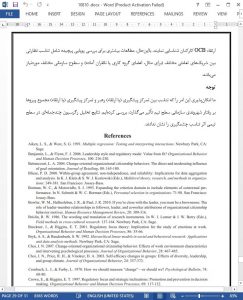Due to increasing organizational demand and competition, employees’ goal-pursuit regulatory processes become pivotal to their work behavior and outcomes. Drawing on interpersonal regulatory fit theory, we proposed that leader prevention focus would moderate the relation between follower prevention focus and maintenance organizational citizenship behavior (OCB), whereas the relation between follower promotion focus and change OCB would be moderated by leader promotion focus. We tested these fit hypotheses using cross-level polynomial regression analyses conducted on 117 leader and 641 followers in South Korean firms. The results showed that followers’ prevention focus was positively associated with their maintenance OCB. This main effect was more pronounced when the leader’s prevention focus was high than when it was low. While we detected a significant main effect of follower promotion focus on change OCB, no fit effect was found for promotion focus. The implications of these findings as well as directions for future research are addressed.
The increasing complexity and interdependence of tasks in the workplace require employees to perform beyond their formal job duties. Organizational citizenship behavior (OCB), which refers to discretionary, extra-role behavior beyond job descriptions, has been considered a factor that can contribute to organizational effectiveness by maintaining and enhancing the organization’s social and psychological context (Borman & Motowildo, 1993; Organ, 1988). For this reason, a number of studies have explored the antecedents and boundary conditions of OCB. In particular, research grounded in person-environment (P-E) fit theory has shown that when employees’ own characteristics are congruent with those of their work environment, they tend to display more OCB (Kristof, 1996; Kristof-Brown, Zimmerman, & Johnson, 2005). Drawing on this stream of research, we attend to the role of fit in terms of regulatory focus in predicting employees’ OCB. Regulatory focus refers to an individual’s strategic orientation with respect to how to regulate his or her behavior to strive for desired outcomes (Higgins, 1997). According to regulatory focus theory (Higgins, 1997), promotion focus is a strategic orientation that regulates an individual’s cognition and behavior toward the achievement of positive outcomes, whereas prevention focus pertains to a strategic orientation toward the avoidance of negative outcomes.
Limitations and Directions for Future
Research In spite of its theoretical and practical implications, this study has some limitations. First, in this study, OCB was measured by employees’ self-report. Although we controlled for respondent’s social desirability in all data analyses, there is still some possibility that the participant ratings of OCB were affected by rater biases. Future research could address this issue by using third-party ratings of OCB collected from supervisors or peers. Moreover, given the dearth of research on interpersonal regulatory fit and work outcomes, future researchers may need to explore the differential roles of prevention and promotion fit in more diverse work outcomes, such as in-role performance, creativity, and deviant behavior










